April 17, 2025 | 06:13 GMT +7
April 17, 2025 | 06:13 GMT +7
Hotline: 0913.378.918
April 17, 2025 | 06:13 GMT +7
Hotline: 0913.378.918

Mr. Le Xuan Nam adjusts the music volume for the ducks on the farm. Photo: Tung Dinh.
The model of ducks listening to music and not letting them go into the water from when they are young until they are ready to go to the barn is bringing success to Mr. Le Xuan Nam in Tu Lan ward, Viet Yen town, Bac Giang.
The "unique Bac Giang" farm owner said he started testing this model in 2020 despite the ongoing COVID-19 epidemic.
Ducks on the farm of a man born in 1977 listen to music almost day and night. From floor music to regional folk songs. Mr. Nam often plays Bac Ninh Quan Ho folk songs whenever he feeds the ducks. Some other workers like to let the ducks listen to melodious folk songs from the Nghe An and Ha Tinh regions.
Strangely, the ducks tend to feel restless and often run when the music is turned off. Mr. Nam said that he became used to it because he was "lulled" by the music.
"My ducks never go into the pond; they are raised on land. Many times, I still jokingly tell customers that my ducks are clean and beautiful, but when they go into the water, they drown because they don't know how to swim," Mr. Nam said.
Mr. Nam began to realize the idea of raising ducks to listen to music after a few years of raising pigs and chickens and also listening to music.
Duck food also runs on a mechanical system to check volume and quality. The worker or Mr. Nam almost only has one thing to do: increase or decrease the music volume or change the song.
Smartphones and Bluetooth speakers help farm owners like Mr. Nam spend most of the day without going into the duck coop. Almost everything has been taken care of by the automation system.
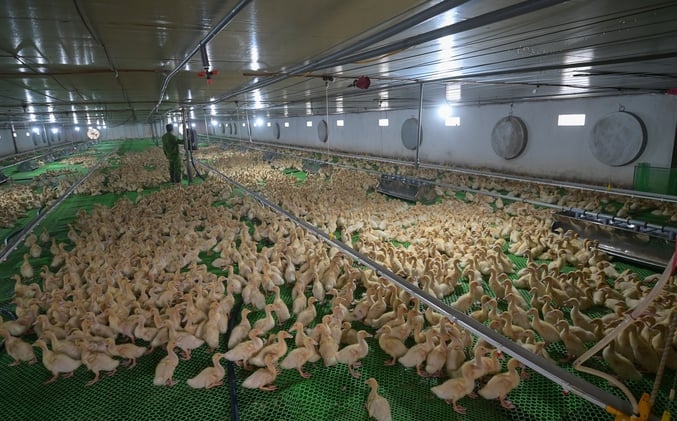
Mr. Nam's ducks are raised in a closed farming system. Photo: Tung Dinh.
On this occasion, Mr. Nam raised more than 30,000 ducks. Each year, the farm produces 3 to 5 litters, weighing about 600 tons. On average, the export price of ducks is about VND 40,000/kg, but sometimes it reaches VND 58,000/kg.
Mr. Nam confidently said that in recent years, consumption has been stable. In the hot season, we sell to customers in Hanoi, Hai Phong, and Bac Ninh. In the cold season, we sell further to Thanh Hoa, Nghe An, and Da Nang.
Duck food is high-quality bran. Ducks are also vaccinated with 6-in-1 vaccines to prevent common diseases such as colitis, cholera, flu, hemorrhagic fever, etc. The lower duck coop is fitted with a soft mesh, and the corners have ventilation fans and mist sprayers, ensuring temperature. Stable from 24-25 degrees Celsius.
Mr. Nam's farm also brings jobs to 7 young local workers. Salary is approximately VND 8 million, including food and accommodation. The worker area is arranged with many rooms and closed toilets. A model that has achieved much success in Bac Giang.
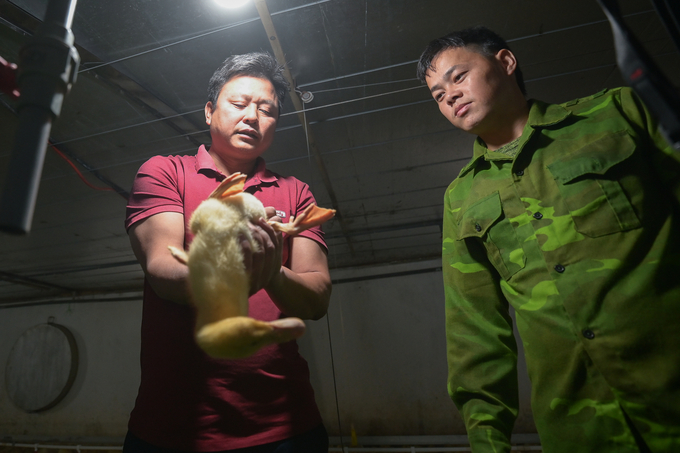
The ducks are raised in a closed environment, vaccinated and have regular health checks. Photo: Tung Dinh.
Remembering when he started to get rich from agriculture, Mr. Nam said the thing he liked most was: "Doing anything requires carefulness. If I do well, everything will come naturally."
When he was young, Mr. Nam liked to work in the direction of both farming and purchasing. Less than 20 years old, Nam planted a garden of onions, chayote, and cabbage, combining purchases from neighboring gardens, like a miniature dealer. Goods are immediately transported to markets and supermarkets in Hanoi, Hai Phong, or the South.
Every day, the couple drives a truck to collect excess potatoes from snack processing factories in the area. The 3.5-ton truck was loaded with potatoes, washed, and fed to the chickens and fish.

The food system is prepared for the automatic supply system for 3 duck farms. Photo: Tung Dinh.
What Mr. Nam cherishes is borrowing more capital to take advantage of the entire waste source from the duck farm. The duck listening to music model still lacks the stage of collecting and turning waste into organic fertilizer.
“I let the waste flow into the sedimentation tank, and from there it flows into the local wastewater treatment system. However, after many days of searching on the Internet and consulting with agricultural officials, I think investing in more systems to collect and treat waste as fertilizer is necessary. That way, you can sell additional gas or supply it for your family," Mr. Nam said.
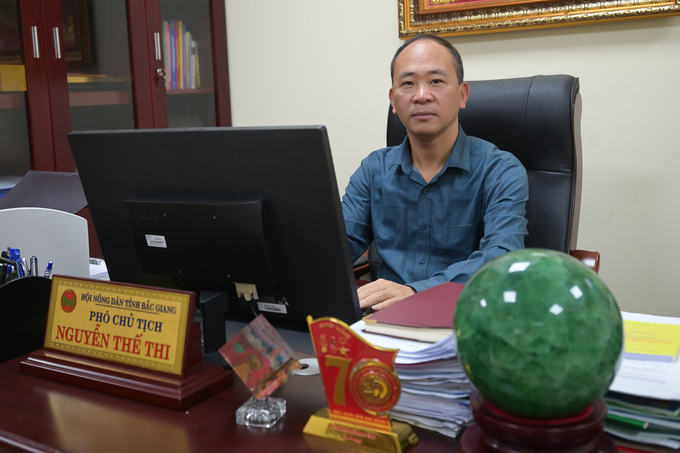
Mr. Nguyen The Thi, Vice Chairman of Bac Giang Provincial Farmers' Association. Photo: Tung Dinh.
Mr. Nguyen The Thi, Vice Chairman of the Farmers' Association of Bac Giang province, said: "Farmers' children are the pioneering generation to change their thinking. They do not necessarily have to go to university but can stay in the cooperative starting a business. You must dare borrow money from banks to create capital conditions."
Leaders of the Bac Giang Farmers Association believe that if you dare to think boldly and innovate in technology, there will be a good way to do it. Mr. Thi gave the example that rural youth can go online to find high-yield plant varieties, go to provinces and cities to look for seeds, consult with neighbors, or go directly to agencies such as the Farmers' Association and Agriculture Service Centers.
Having worked in rural areas for many years, Mr. Thi said that many young people in Bac Giang have applied tree planting technology systems and smart water irrigation systems, initially sharing on social networks such as Zalo and Facebook, with remarkable results.
The Vice Chairman of the Farmers' Association said that this unit has a project to support OCOP product development in 2023-2028 to maintain product upgrades and deep processing, but the most difficult thing is to link. From practical lessons, Dan mountain ginseng can process flowers into tea, wine or food to supply supermarkets. Duck and fish are processed into smoked duck, pork sausage, and spring rolls. The Farmers' Association of Bac Giang province continues to invite supermarkets and sales chains to provide initial support and plan areas with specific products to improve efficiency.
Translated by Tuan Huy
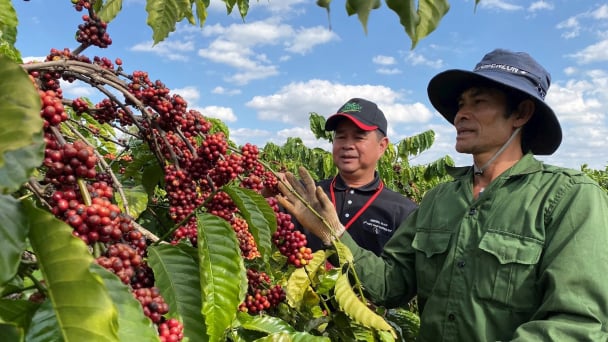
(VAN) Businesses emphasize fairness and equality when integrating social factors into their sustainable development strategies.
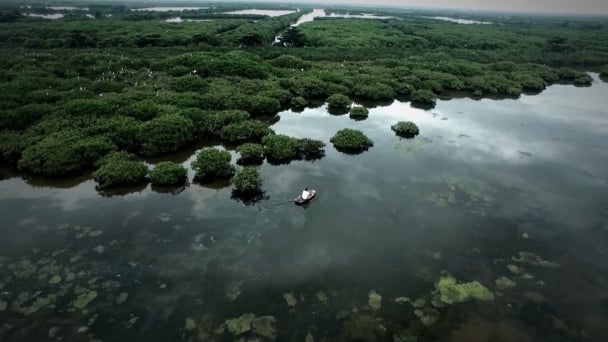
(VAN) French organizations and enterprises propose that Thai Binh province provide potential and long-term cooperation contents related to climate change response and green industrial development.
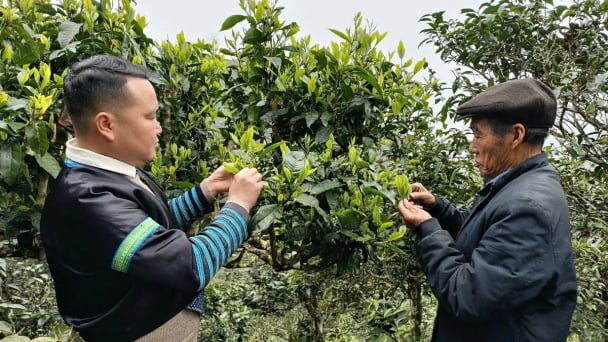
(VAN) Shan Tuyet tea is considered a 'heavenly treasure'. The H'mong people allow the tea to grow naturally, adhering to organic production principles, with the aim of exporting the product.
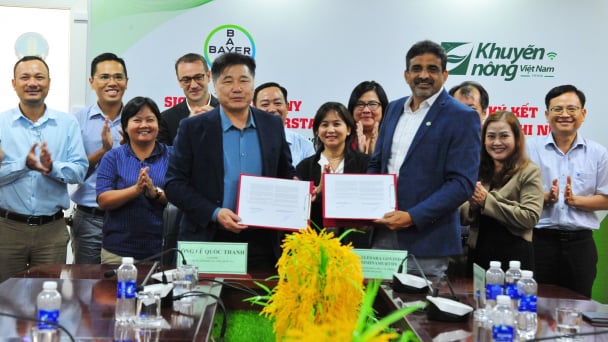
(VAN) Bayer Vietnam and the National Agricultural Extension Center have signed a partnership agreement to expand the development of effective and safe farming models for rice, durian, and coffee.
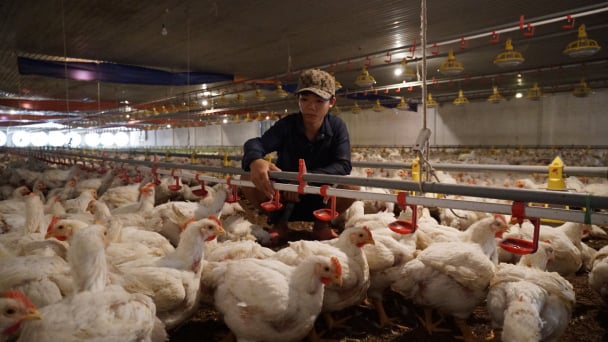
(VAN) Tay Ninh province possesses all the favorable conditions, from natural advantages to geographic location and social harmony, to drive economic development, particularly in attracting investment and advancing modern livestock farming.
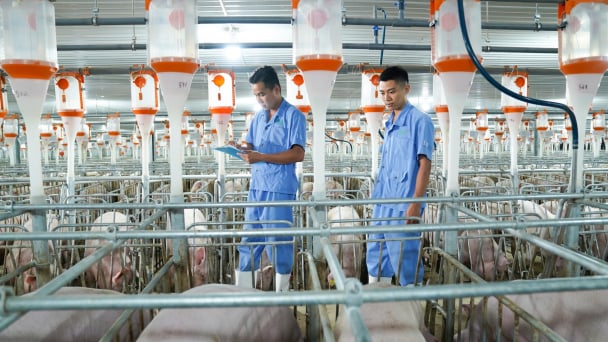
(VAN) Notably, every link in BAF's entire closed livestock value chain Feed - Farm - Food has received international certification.
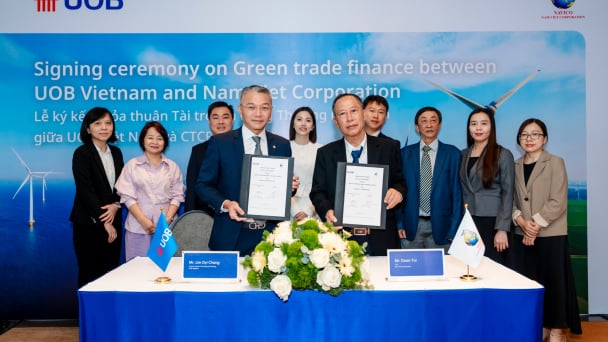
(VAN) UOB Vietnam has recently signed a green credit agreement with NAVICO to develop sustainable aquaculture that meets international standards.